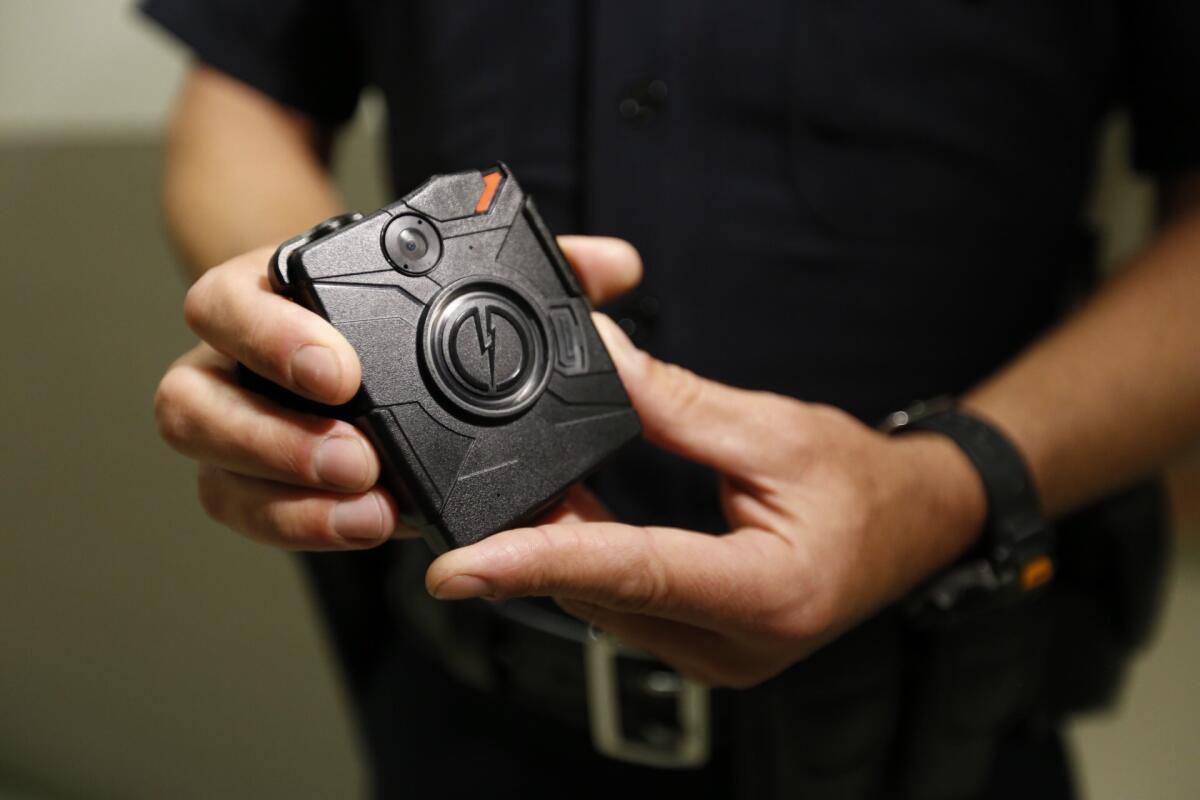ACLU to Justice Department: Don’t give LAPD money for body cameras

LAPD Officer Jim Stover demonstrates the Police Department’s body cameras at Mission Division.
- Share via
Citing “deep reservations” with the LAPD’s body camera policy, the local chapter of the American Civil Liberties Union urged federal officials on Thursday not to give the department money to buy more of the devices.
The ACLU’s 11-page letter sent to Washington, D.C., on Thursday morning was the latest in which the organization has voiced its concerns about how the Los Angeles Police Department cameras — and their footage — will be used. A key issue: The LAPD has said it doesn’t intend to make video from the cameras public unless required through a criminal or civil court proceeding.
“We believe that the LAPD’s policy does not promote — and in fact undermines — the goals of transparency, accountability and creation of public trust that body-worn cameras should serve,” senior staff attorney Peter Bibring wrote.
“Accordingly, we respectfully request that the Department of Justice deny LAPD’s request for funding and instead direct federal support of body-worn cameras to agencies whose police align more closely with the objectives of the program and a better promise to build public trust,” he continued.
Last year, President Obama earmarked $75 million in federal funds to help local police agencies purchase the body cameras, part of his efforts to help strengthen relationships between police and citizens after a series of high-profile killings by police.
Last week, the LAPD’s chief information officer told the Police Commission that the department had applied for some of the funds available, with hopes of using federal money to purchase 700 cameras. The city has plans to buy 7,000 cameras for LAPD officers. Some money has been allocated in the city’s budget, but officials also are looking for outside grants.
Police Commission President Steve Soboroff said Thursday morning that he was “disappointed” by the ACLU’s letter, saying the benefits of the cameras were too important to delay using them. Soboroff stressed that the policy for the cameras covered the majority of concerns — and that the commission would evaluate the program in six months to see whether any changes should be made.
“To me, this is sour grapes,” he said. “Cut off our funding? Give me a break. I’m shocked.”
The ACLU has said it generally supports the use of body cameras by police but withdrew its support of the LAPD’s program over a policy that Bibring wrote “suffers from serious flaws.” The ACLU has sent the Police Commission other letters outlining its concerns, including one submitted days before the first cameras were rolled out earlier this week.
The policy — approved by the Police Commission’s 3-1 vote in April — allows officers to review the footage before writing reports or giving statements to internal investigators. The ACLU and other critics have said that giving officers but not the public a chance to see the footage undermines the accountability the cameras are intended to bring.
LAPD Chief Charlie Beck has said that allowing officers to first look at the footage would help them “get to the truth of what occurs,” a key objective in using the body cameras. Beck said he doesn’t intend to make the footage public in the vast majority of cases, citing privacy issues and the fact that the footage could be used as evidence in court.
The LAPD began distributing the first batch of cameras — 860 purchased through private donations — on Monday. Uniformed officers working in the San Fernando Valley’s Mission Division were the first to get the devices; South L.A.’s Newton Division is slated to get the cameras in mid-September.
Follow @katemather for more news about the LAPD body cameras.
ALSO:
Defiant Kentucky clerk ordered to jail for blocking same-sex marriage licenses
Former Clinton staffer signals he will invoke 5th Amendment in email inquiry
Stories of Mexican mothers having babies in U.S. are complex, Texas doctors say
More to Read
Sign up for Essential California
The most important California stories and recommendations in your inbox every morning.
You may occasionally receive promotional content from the Los Angeles Times.











